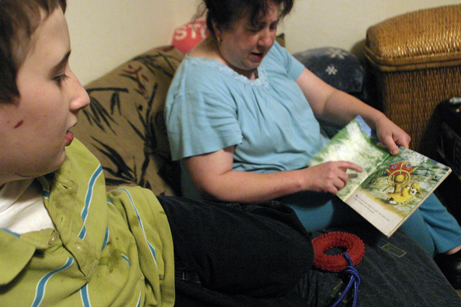
Parent’s group shares experience
When her son Nathan Coronado was diagnosed with autism last
spring, one of the first places Victoria Coronado turned to for
information was the Autism Parent Club of San Benito County.
Parent’s group shares experience
When her son Nathan Coronado was diagnosed with autism last spring, one of the first places Victoria Coronado turned to for information was the Autism Parent Club of San Benito County.
“One parent said, ‘Don’t worry about the name [of the disorder]'” Coronado said. “Worry about the services.”
The club is part of the Parents Helping Parents network, a group headquarted in Santa Clara for parents with special needs children.
Back when Marcella Harris’ son Thomas Teeters and Karen Tonascia’s son Joey were diagnosed with autism there wasn’t an organized group for parents in San Benito County.
“One mother was involved in self-advocacy,” Harris said. “When you have kids in special education, you get to know each other, but there wasn’t really a club.”
Harris and some other parents decided to create a more cohesive club with regular meetings and special guests who would come down to San Benito to talk about autism-related topics. Harris approached Parents Helping Parents, though San Benito is outside of their jurisdiction. After talking with the group they agreed to allow the Hollister club to sign on as an affiliate. Parents who join pay a membership fee, but have access to a library at the San Jose facility as well as local lectures, workshops and grants.
Duane Holt, whose daughter Rachel has autism, has been involved with the group since the start.
“It’s a small group. A lot of times it’s just four or five people [at the meetings],” Holt said. “But its sharing ideas and knowledge – things you’ve learned and resources.”
Tonascia agreed.
“When our group got started – it was four or five years ago – it was just a bunch of us that just wanted to keep in touch,” she said. “It’s not really a support group. We don’t sit around and cry about our kids.”
The goal is to keep people informed and to serve as a place to brainstorm.
Tonascia’s family is one of the few with an autistic teenager.
“It’s nice for me to be at some of these meetings,” Tonascia said. “These moms come in and their kid’s just been diagnosed and they are thinking what is going to happen when he’s 13? It’s nice to be in that spot where you can say it gets easier.”
The topics of meetings and lectures run the gamut from potty training, which can be especially difficult for children with autism, to different diets that may help relieve some symptoms of autism.
“We try to have a speaker come regularly,” Harris said.
During one meeting a 25-year-old woman with autism came to speak to the club. Harris and Tonascia remember her well.
“She was diagnosed with severe autism and she was completely nonverbal,” Tonascia said.
But the woman had learned to communicate using the assistance of a machine that allowed her to type her thoughts.
“It was amazing to hear how these people feel with autism,” Tonascia said. “She expressed herself in complete thoughts and was very articulate.”
The woman described how threatened she felt when people got too close to her and what she called “face blindness,” which made it hard for her to recognize people by their face. Instead she used smell to recognize people.
“I remember one of the questions I asked was if she had close friendships or people she loved,” Tonascia said. “She said she loved her cat, but didn’t really have any emotional attachments to any people.”
In addition to lecturers, the group offers grants for caregivers or teachers to attend autism workshops or seminars.
“We hold fund-raisers to offset the expense and provide grants for people who work with kids with autism,” Harris said. “It can be a teacher, caregiver. It can be used for materials – crayons or for special toys for autistic children.”
School aides have even benefited from some grants.
“Sometimes parents suggest trainings,” said Karen Twaddell, the director of student services for the Hollister School District.
The parent club might also solve some social issues for some of the kids.
Joey Tonascia, who is one of five children, is popular at school, but doesn’t have close friends.
“The others [Joey’s siblings] are always getting invited over or spending the night [at a friend’s houses] and doing stuff like that,” Tonascia said. “He really wants that but he doesn’t know how to have it. It’s such a natural thing, but for our kids it’s just so foreign.”
Tonascia has hope that a play date will be in Joey’s future, partly thanks to connections she’s made at the parent club.
“I’ve made some good friends and one of the other moms whose son was just diagnosed last year is Joey’s age,” Tonascia said. “I’ve been wanting to get them together. They both are in need of friends.”
For more information on the Autism Parent Club of San Benito County, visit www.autismparentsclub.com or call 637-0750.








